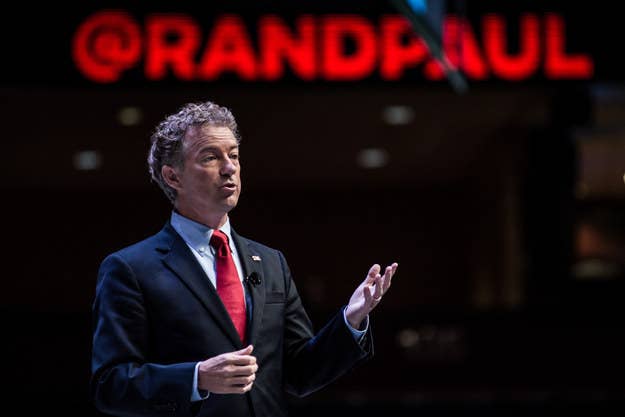
WASHINGTON — Despite poor fundraising numbers and the possibility that the candidate may be bumped down to the next undercard debate, supporters of and advisers to Rand Paul say the campaign is not in danger of shutting down yet.
People close to Paul are emphasizing that though the campaign doesn't have much money — it pulled in a mere $2.5 million in the third quarter — the campaign is also running a leaner operation than, for example, Scott Walker, who had an expansive organization that was later cited as one of the campaign's biggest flaws after he had dropped out.
"I can tell you that in this race we’re being extremely frugal about our money and how we spend our money," said Mike Biundo, a national senior adviser to the campaign. Biundo, who was Rick Santorum's campaign manager in 2012, pointed out that the Santorum 2012 campaign also had a small budget and an economical operation but still won Iowa and "was the runner up to Mitt Romney."
"We’re spending less money in a month than Walker was in a week," Biundo said.
"I think they have been very lean in how they’ve been running it so far," said one adviser to the campaign who spoke on condition of anonymity. "So I do not get the sense he’s on the verge of dropping out or they’re really short of money or anything like that. You can run these things on a shoestring."
The numbers show that Paul has been spending quite a bit of the money he has, though. The Paul campaign says it now has $2 million cash on hand. But at the second quarter, the campaign had over $4.1 million cash on hand — meaning the campaign spent more than it raised in the third quarter. One of the costs incurred during the third quarter: transferring $250,000 to the Republican Party of Kentucky to help fund the state's caucuses, so Paul is able to run for both president and his senate seat concurrently.
There have been other concerning signs. Purple PAC, a pro-Paul libertarian super PAC, said this week that it was no longer raising money for him. And the latest Real Clear Politics polling average has Paul with 2.3% of the vote, meaning he is at risk of being bumped down to the undercard debate — candidates for the next debate must meet a threshold of 3%.
The campaign sent a note to top donors and supporters this week alerting them to the fundraising numbers coming out and emphasizing that the campaign is not running an unwieldy operation like Walker's.
Senior adviser Doug Wead said the campaign held a meeting yesterday that was "full speed ahead" and that multiple projects were discussed, such as finding and recruiting delegates in key states. Wead says there was a discussion of making a new hire even in yesterday's meeting. Another Paul aide told BuzzFeed News that the campaign had made a few new hires in the past two weeks.
Biundo said the campaign had hired people in states like Minnesota that hold caucuses instead of primaries, as part of a strategy to prepare for states beyond the first few contests as well as continuing to build an organization in Iowa and New Hampshire.
"You can’t just come out of Iowa or New Hampshire with a tail wind behind you," he said. "You need to be working those caucus states in addition to them."
Frayda Levin, a major GOP donor and Paul backer, said Paul's third-quarter haul doesn't fully reflect his current standing because the Kentucky Republican's fundraising didn't really kick in until after the second debate in the last few weeks of the quarter.
"I think there is much more of a positive feel in the libertarian community after the last debate," she said, adding that she was able to easily convince a few people at a recent Cato Institute conference to max out to Paul's campaign.
Levin, who has bundled money for Paul's campaign and contributed to one of the super PACs supporting him, said donors at an event a few days before the debate urged Paul to highlight his libertarian positions instead of trying to become more of a mainstream Republican in the crowded presidential primary. "They were pleased with how Rand listened. He came with his wife and really took to heart some of the concerns."
Reason magazine, a libertarian publication, praised Paul after the debate for having "consistently brought libertarian—or at least libertarianish—perspectives on major policy debates."
Reflecting what the campaign had said in its note to supporters, Levin said that despite the low third-quarter haul, Paul is nowhere close to dropping out because he doesn't have a big operation — as Walker did — and doesn't need as much money to stick it out. "His staffing level has been pretty low. He has been more careful about that," she said.
She also said that it's unfair to compare Paul's fundraising with that of his father's when he ran for president. "It's just a very different race." Ron Paul at certain points during the 2012 cycle raised more than twice as much money in a single day than his son did this past quarter.
Despite the glimmers of hope, one adviser to the campaign who spoke on condition of anonymity said "I think there’s already been some cutting back," and that "the campaign headquarters used to be jammed with people coming and going and now it's quite thinned out."
"But some of that may be just reorganizing," the adviser said. "I don't know that they were all on payroll, all of these people."
"No we haven’t cut people from headquarters," Biundo said. "There’s not less people buzzing around, we’ve deployed people out to do different things."

